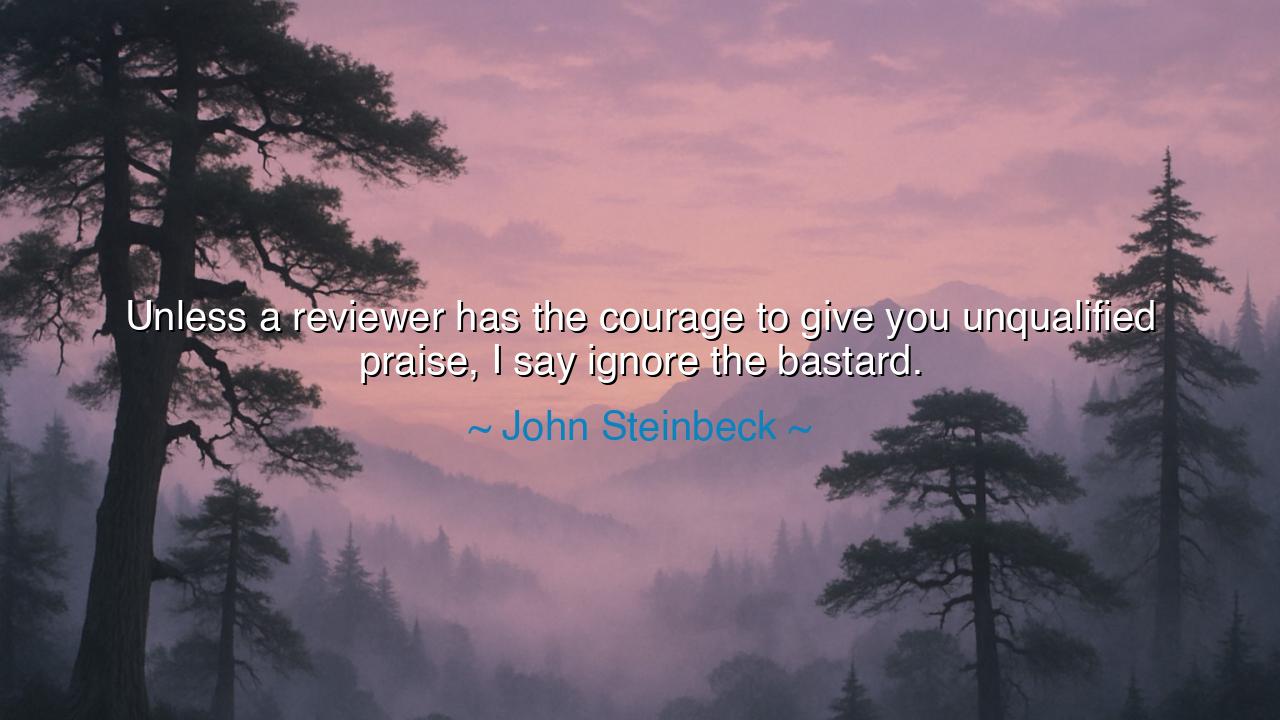
Unless a reviewer has the courage to give you unqualified praise
Unless a reviewer has the courage to give you unqualified praise, I say ignore the bastard.






When John Steinbeck, the great American novelist, declared, “Unless a reviewer has the courage to give you unqualified praise, I say ignore the bastard,” he was not merely expressing the irritation of an artist toward his critics — he was laying bare a deeper truth about creation, courage, and self-belief. His words, at once humorous and cutting, speak from the battle-scarred heart of one who knew that to create is to expose one’s soul to the arrows of judgment. For the creator, whether artist, thinker, or dreamer, the world is filled with those who watch from the shadows, eager to measure, dissect, and condemn what they themselves could never have the courage to attempt. Steinbeck’s cry is not one of vanity, but of defiance — a defense of the sacred flame of creation against the chill winds of cynicism.
Steinbeck spoke as one who had lived under the burden of scrutiny. His novels, from The Grapes of Wrath to East of Eden, shook the conscience of a nation and stirred both love and rage in equal measure. Critics called him sentimental, political, even presumptuous in his empathy for the poor and dispossessed. But Steinbeck knew that to write truthfully was to stand naked before the world. His quote, born from years of battle with the pen and the press, reminds us that true art — and true purpose — cannot be weighed by the approval of others. The artist’s duty is not to please, but to reveal; not to conform, but to create. Those who cannot see the light in your work are often blinded by their own darkness.
There is an ancient echo to Steinbeck’s defiance. The philosopher Epictetus once said, “If you wish to improve, be content to be thought foolish and stupid.” Likewise, Michelangelo, ridiculed by rivals while painting the Sistine Chapel, pressed on in silence, guided not by praise but by vision. For the work of creation — whether in marble, in words, or in life itself — demands a kind of divine stubbornness. The creator must trust his own voice above the chorus of critics. Praise, when it comes, must be pure, not calculated; it must spring from courage, not courtesy. That is why Steinbeck, half in jest but wholly in truth, said to ignore all voices but those brave enough to praise without hesitation — for such voices recognize greatness not through fear or envy, but through understanding.
This quote, however, carries a warning as much as it carries pride. Steinbeck’s challenge is not a license for arrogance, but a call for inner confidence. The artist must learn to discern between critique born of wisdom and criticism born of weakness. The world is full of reviewers who tear down what they cannot build. But now and then, a voice of true counsel appears — one that does not flatter, but elevates. To listen rightly is an art in itself. The great creator must be humble enough to learn, but fierce enough to ignore the unworthy judgment of the timid. For those who fear to praise wholeheartedly are often those who fear to feel deeply — and the artist’s task is to awaken feeling, not to soothe it.
Consider Vincent van Gogh, whose paintings were dismissed and mocked by nearly every critic of his time. He sold only one painting in his life, yet he continued, possessed by the fire of vision. Had he listened to the “reviewers,” the world would never have known the trembling beauty of Starry Night or the tender sorrow of The Bedroom. His legacy, born of rejection and persistence, proves Steinbeck’s point: greatness demands deafness to all voices but the one within. For praise, when it comes too late, is merely an echo — and the true artist works not for applause, but for truth.
Steinbeck’s words also strike at a modern truth beyond art — a truth for all who labor to build something meaningful in a world quick to judge. Every person who dares to create, to lead, or to love deeply must face the critics of life. There will always be those who watch your every step, who offer their opinions unearned. But remember this: no statue was ever erected to a critic. History forgets the voices of those who sneered, but it remembers the hands that dared to build. Courage, then, is not in avoiding criticism, but in continuing your work in spite of it — perhaps even because of it.
So, my listener, take Steinbeck’s lesson to heart. When you create, pour yourself out without apology. When others judge, listen only if their words ring with the music of courage, not the mutter of envy. Seek those rare souls who can see the beauty of your effort, who celebrate your light without condition — and to the rest, offer only silence. For the critic’s voice fades like dust, but the creator’s work endures like stone. Remember this: the world belongs not to those who review it, but to those who dare to make it new.






AAdministratorAdministrator
Welcome, honored guests. Please leave a comment, we will respond soon